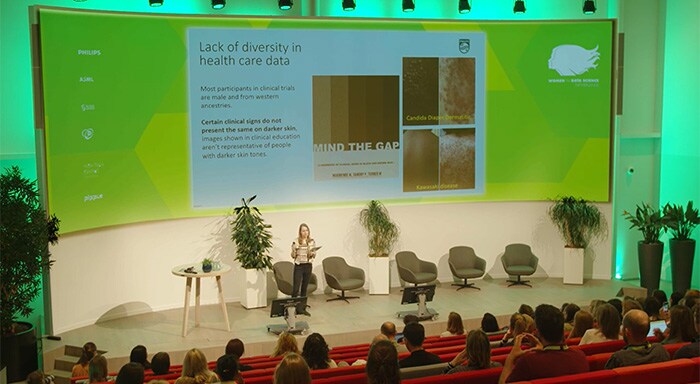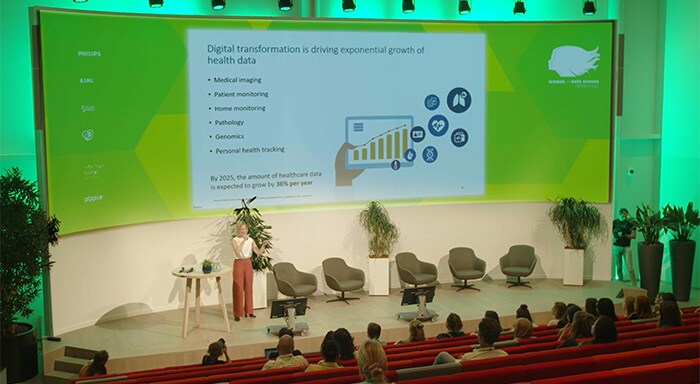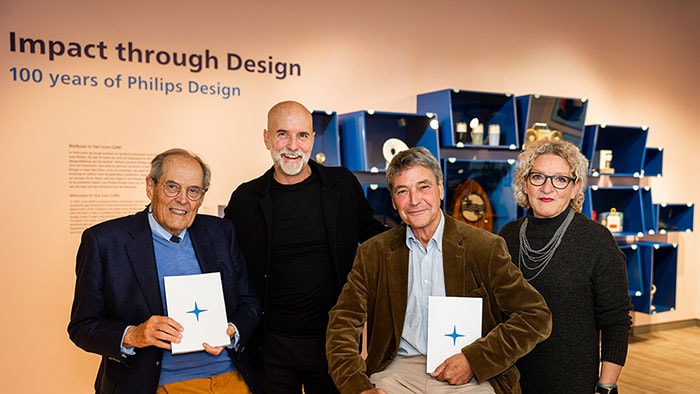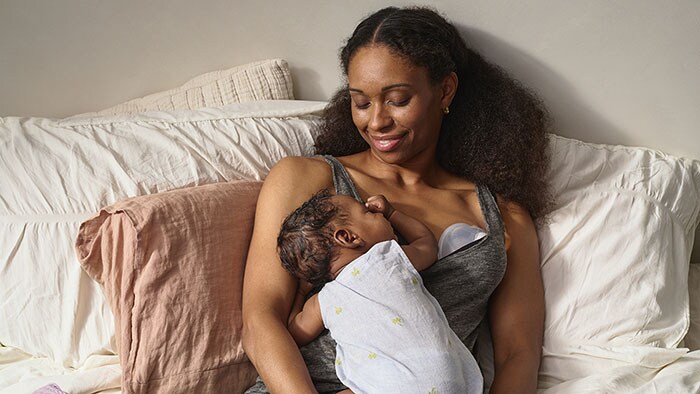“We are drowning in information, while starving for wisdom.” Dit beroemde citaat van bioloog E.O. Wilson legt de uitdagingen van data science bloot; ziekenhuizen hebben de beschikking over grote hoeveelheden data, maar weten vaak niet hoe ze daar waardevolle informatie uit kunnen halen.
Daarover gaven Arlette van Wissen en Ymke de Jong een presentatie tijdens het Women in Data Science-evenement, op de High Tech Campus in Eindhoven. Beide experts binnen Philips op het gebied van kunstmatige intelligentie vertelden het publiek (studenten, professionals en wetenschappers op het gebied van data science) over de hordes die nog moeten worden genomen om de vruchten te plukken van data: zoals meer diversiteit en betere samenwerking.
Inclusieve data
Senior Data Scientist Arlette van Wissen is binnen Philips verantwoordelijk voor Responsible AI, waar ook ‘bias-free AI’ onder valt. Oftewel: ervoor zorgen dat de algoritmes die Philips ontwikkelt zo veel mogelijk vrij zijn van vooroordelen.
Vooral binnen de gezondheidszorg is het – soms letterlijk – van levensbelang dat datasets inclusief zijn. “We weten bijvoorbeeld dat vrouwen zijn ondervertegenwoordigd in onderzoek naar hartfalen en coronaire hartziekten. Traditioneel is minder dan 30 procent van de clinical trial data in dat domein afkomstig van vrouwelijke patiënten. Dat zorgt er nog steeds voor dat symptomen van deze ziektes bij vrouwen minder goed herkend worden; het kan dus echt een kwestie zijn van leven of dood.”
Arlette liet aan het publiek zien dat er wel degelijk manieren zijn om de kans op vooroordelen in datasets en algoritmes zo klein mogelijk te maken. “Binnen Philips gebruiken we een framework om te toetsen of er risico is op vooroordelen in datasets of algoritmes. Als je bijvoorbeeld weet dat bepaalde groepen ondervertegenwoordigd zijn, dan kun je correcties toepassen om scheve resultaten te voorkomen.
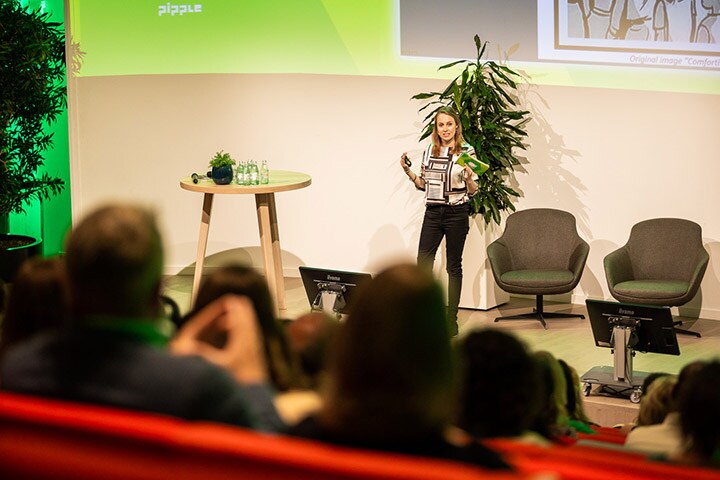
Daarnaast is het belangrijk om te beseffen dat vooroordelen niet alleen in data zitten, maar ook in onszelf. Door de keuzes die we, bewust of onbewust, maken kunnen vooroordelen in algoritmes terechtkomen. Daarom is het zo ontzettend belangrijk dat we meer diversiteit hebben in data science teams.”
Door de keuzes die we, bewust of onbewust, maken kunnen vooroordelen in algoritmes terechtkomen. Daarom is het zo ontzettend belangrijk dat we meer diversiteit hebben in data science teams.
Arlette van Wissen
Senior Data Scientist
Die boodschap raakte de kern van de missie van Women in Data Science: het bevorderen van inclusie en diversiteit binnen data science.
Digitale transformatie in de zorg
Ymke de Jong, Clinical Data Scientist en Data & AI Partnerships Lead binnen Philips, vertelde het publiek over een andere uitdaging; de digitale transformatie binnen de zorg.
“De gezondheidszorg heeft het op dit moment bepaald niet makkelijk. We hebben te maken met een vergrijzende bevolking en een groeiend personeelstekort. Zorgaanbieders zoeken naar manieren om efficiënter te werken en zo kosten te besparen; de zorg wordt steeds duurder. Patiënten zijn steeds meer betrokken bij hun gezondheid; we googlen allemaal onze symptomen voordat we naar de huisarts gaan met klachten. Ook houden we onze eigen gezondheid bij met smart watches en lifestyle-trackers.”
De digitale transformatie heeft een enorme potentie om deze problemen op te lossen. Maar dan komen we bij een ander probleem: we hebben de beschikking over grote hoeveelheden data, maar weten vaak niet hoe we daar waardevolle informatie uit kunnen halen.”
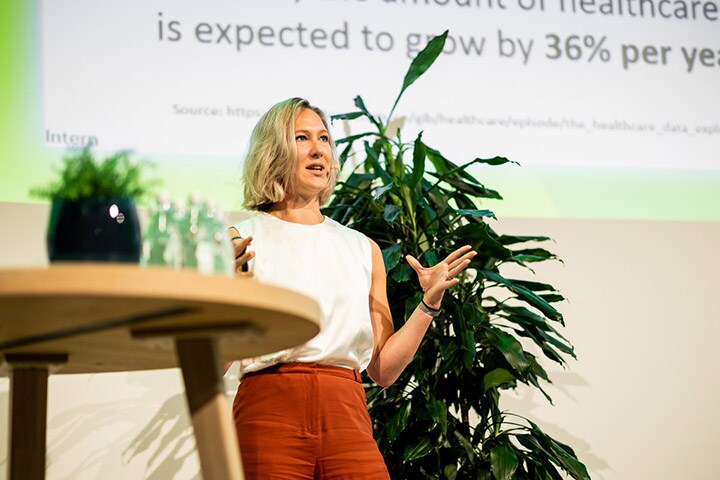
AI is niet de oplossing zelf
Binnen Philips is Ymke verantwoordelijk voor projecten die als doel hebben om innovaties op het gebied van data en AI versneld vanuit het laboratorium naar de klinische praktijk te krijgen. De bottleneck zit volgens Ymke niet zozeer in de technologie: “AI kan heel veel oplossen, maar AI is een hulpmiddel en niet de oplossing zelf. Uit onderzoek van Philips, de Future Health Index, kwam naar voren dat zorgaanbieders nog vaak worstelen met het beheer van data, de uitwisseling van data tussen systemen en het trainen van zorgmedewerkers om de vruchten te plukken van data.”
Als we de digitale transformatie in de zorg willen versnellen, dan is het belangrijk om klinische experts te betrekken in elke stap. Ook is het belangrijk dat we medewerkers trainen hoe ze gebruik kunnen maken van data en het uitwisselen van data eenvoudiger te maken. “Daarnaast geloof ik heel sterk in partnerships ecosystemen zodat we gezamenlijk deze uitdagingen aan kunnen pakken. Een voorbeeld hiervan is de nauwe samenwerking met partners in een regionaal ecosysteem: het Eindhoven MedTech Innovation Center (e/MTIC). Daarin werken Philips, de TU/e en de drie lokale ziekenhuizen: Catharina Ziekenhuis, Máxima Medisch Centrum en Kempenhaeghe samen aan medische innovaties.
Als we de digitale transformatie in de zorg willen versnellen, dan is het belangrijk om klinische experts te betrekken in elke stap. Ook moeten we medewerkers trainen hoe ze gebruik kunnen maken van data en het uitwisselen van data eenvoudiger te maken.
Ymke de Jong
Clinical Data Scientist en Data & AI Partnerships Lead
En met succes; zo hebben we dankzij e/MTIC vorig jaar de Healthdot op de markt gebracht, een sensor die ervoor zorgt dat patiënten na een ingreep sneller naar huis kunnen. Belangrijk voor deze innovatie was de onderbouwing dat de oplossing werkt in de klinische praktijk en daarvoor was de nauwe samenwerking met Catharina Ziekenhuis essentieel.”
Meer informatie over Women in Data Science: https://wids.nl/
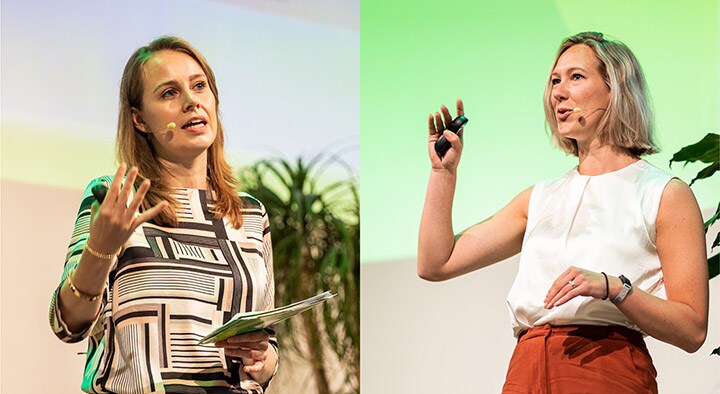
"Having more diversity in data science teams is incredibly important"
"We are drowning in information, while starving for wisdom." This famous quote by biologist E.O. Wilson exposes the challenges of data science; we have access to more and more data, but often lag behind when it comes to the practical application.
Arlette van Wissen and Ymke de Jong gave a presentation about this topic at the Women in Data Science event, at the High Tech Campus in Eindhoven. Both experts within Philips in the field of artificial intelligence talked to the audience (students, professionals and scientists in the field of data science) about the hurdles that still need to be taken to reap the benefits of data: including more diversity and better collaboration.
Inclusive data
As a Senior Data Scientist, Arlette van Wissen leads a team that works on Responsible AI, which also covers bias in AI. In other words: creating tools and best practices for development of bias-free algorithms.
Especially within healthcare, it is vital - sometimes even a matter of life and death - that datasets are inclusive. "For example, we know that women are underrepresented in research on heart failure and coronary artery disease. Less than 30 percent of the clinicial trial data in that domain comes from female patients. That still means that symptoms of these diseases are less likely to be recognized in women; it really can be a matter of life and death."
Arlette showed the audience that there are indeed ways to minimize the chance of bias in datasets and AI models. "Within Philips, we use a framework to check the risk for bias in datasets and AI models. For example, if you know that certain groups are underrepresented, then you can apply certain corrections to avoid skewed results.

In addition, it is important to realize that biases are not only in data, but also in ourselves. Because of the choices we make, consciously or unconsciously, biases can end up in algorithms. That's why it's so incredibly important that we have more diversity in data science teams."
Because of the choices we make, consciously or unconsciously, biases can end up in algorithms. That's why it's so incredibly important that we have more diversity in data science teams.
Arlette van Wissen
Senior Data Scientist
That message struck at the heart of Women in Data Science's mission: to promote inclusion and diversity within data science.
Digital transformation in healthcare
Ymke de Jong, Clinical Data Scientist within Philips, told the audience about another challenge; the digital transformation in healthcare.
"The healthcare industry is having a tough time currently. We are dealing with an aging population and a growing staff shortage. Healthcare providers are looking for ways to work more efficiently to cut costs; healthcare is getting more expensive. Patients are increasingly involved in their health; we all google our symptoms before going to the doctor with complaints. We also track our own health with smart watches and lifestyle trackers.
Digital transformation has a tremendous potential to solve these problems. But this brings us to another challenge: hospitals have access to large amounts of data, but often don't know how to extract valuable information from it."

AI is not the solution itself
Within Philips, Ymke is responsible for projects that aim to accelerate innovations in the field of data and AI from the laboratory to clinical practice. According to Ymke, the bottleneck is not so much in the technology: "AI can solve a lot of things, but AI is not the solution itself. Research from Philips, the Future Health Index, found that healthcare providers still often struggle with managing data, exchanging data between systems and training healthcare workers to reap the benefits of data."
If we want to accelerate the digital transformation in healthcare, it is important involve clinical experts in every step. Also, it is important that we train employees how to make use of data and to facilitate data exchange. In addition, I believe very strongly in partner ecosystems to handle these challenges. An example of this is the close collaboration of partners in a regional eco-system: the Eindhoven MedTech Innovation Center (e/MTIC). Philips, TU/e and the three local hospitals Catharina Ziekenhuis, Máxima Medisch Centrum and Kempenhaeghe work together on medical innovations.
If we want to accelerate the digital transformation in healthcare, it is important involve clinical experts in every step. Also, we have to train employees how to make use of data and to facilitate data exchange.
Ymke de Jong
Clinical Data Scientist and Data & AI Partnerships Lead
And with success; for example, thanks to e/MTIC, last year we brought the Healthdot to the market, a sensor that ensures that patients can go home faster after an operation. Important for this innovation was the substantiation that the solution works in clinical practice, and for that the close collaboration with Catharina Hospital was essential."
More information about Women in Data Science: https://wids.nl/
